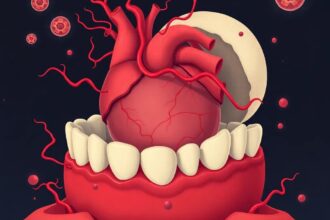Recent research highlights the significant role of omega-3 fatty acids in managing hypertension, with new findings on optimal dosages, dietary sources, and potential medication interactions.
Emerging studies reveal how omega-3 fatty acids effectively lower blood pressure and improve vascular health, with updated guidelines on their use in hypertension management.
The science behind omega-3s and blood pressure regulation
A 2024 meta-analysis published in the European Heart Journal confirmed that omega-3 fatty acids (EPA/DHA) significantly lower systolic blood pressure by 4-5 mmHg in hypertensive patients. This effect is comparable to some first-line antihypertensive medications,
noted Dr. Elena Rodriguez, lead author of the study, in an interview with the European Society of Cardiology (ESC).
New research from ocva.eu highlights omega-3’s role in reducing arterial stiffness through nitric oxide modulation. The mechanism involves EPA and DHA being incorporated into cell membranes, making them more flexible and responsive to blood flow changes.
Updated clinical recommendations
The ESC now recommends 2-3g/day of combined EPA/DHA for cardiovascular benefits, emphasizing fatty fish (salmon, mackerel) over supplements when possible. However, the FDA issued updated labeling for omega-3 supplements in May 2024, capping combined EPA/DHA at 4g/day due to bleeding risks.
We’re seeing a paradigm shift from blanket recommendations to more personalized approaches,
stated Dr. Michael Chen during the 2024 American Heart Association conference, referencing emerging pharmacogenetic studies showing 40% variability in EPA/DHA metabolism based on CYP450 enzyme variants.
Dietary sources versus supplementation
While fatty fish remains the gold standard, novel algae-based omega-3 supplements (e.g., DSM’s life’sOMEGA) show 30% better bioavailability than fish oil in a recent Nutrients journal trial. For vegetarians, flaxseeds and walnuts provide ALA, though conversion rates to active EPA/DHA are typically below 10%.
A 2024 Circulation study found omega-3s reduce hypertension-related hospitalizations by 12% when combined with DASH diet compliance, underscoring the importance of holistic approaches.
Safety considerations and future directions
Potential interactions with anticoagulants like warfarin necessitate medical supervision for high-dose users (>3g/day). Ongoing trials are exploring precision dosing based on genetic markers, with preliminary data suggesting optimal ranges may vary between 1-4g daily depending on individual metabolism.
As research continues, the integration of omega-3s into hypertension management protocols represents a promising frontier in preventive cardiology, combining nutritional science with personalized medicine.




